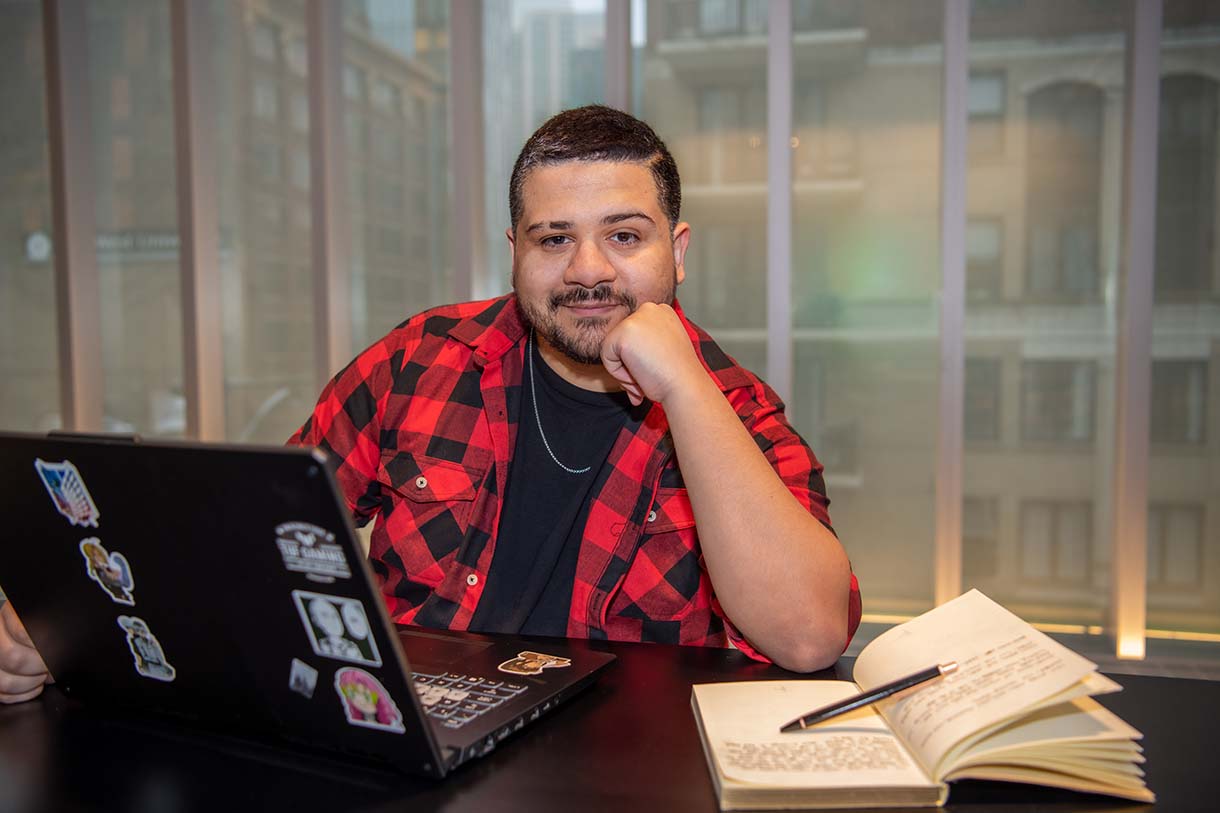Student Explores Video Game Storytelling and Wins Gold

“Video games can fundamentally change how we tell stories in a way that we could never do before,” says Mathew Rosario, a Creative Writing student with a minor in Game Design.
Video games, it turns out, can also change a student’s trajectory. Thanks to video game storytelling and Rosario’s ability to tap into his own painful life experiences, he is headed to San Francisco for the Game Developers Conference (GDC). There, he’ll be recognized as Gold Award Winner of the GDC Game Narrative Competition. And if he’s lucky, find a job.
The gold-winning narrative: A class project that was just that good. The class assignment: A deep dive into an element of a game, dissecting it from a technical gaming standpoint but also from a personal point of view.
As a writer and Navy veteran who saw violence and death, Rosario experienced the video game Nier: Automata in a very personal way. The game explores a war between alien-created machines and human-crafted androids. When Rosario first started playing it, his traumatic military career had just ended, and the COVID-19 pandemic had just begun. The game’s postapocalyptic world and focus on defining humanity resonated with him immensely.
“The game is about what it means to be human,” he says. “The androids live in a world that, much like ours, is often unforgiving. And so, they must wrestle with grief and guilt and despair, and all of these things that we, as humans, have to feel. And through those encounters and through those struggles, that's where they find the true meaning of humanity.”
Interactive Arts and Media Associate Professor Bill Guschwan was so impressed by Rosario’s video submission, he asked Rosario to transcribe the video and submit the transcript to the GDC Game Narrative Review Competition.
“Mathew’s video and performance in reading, it was moving. I thought what his military experience must have been like and how a game could transform his identity for good,” Guschwan says. “His pauses and tonal phrasing were great. The content demonstrated how video games can impact players as art.”
Rosario’s ability to share his military experiences didn’t come easily. But then, Columbia College Chicago didn’t come easily to him either.
He first thought of coming to Columbia after high school but, concerned he wouldn’t get in, chose a career in the military instead. While he credits the Navy for shaping him into the person he is today and had positive experiences, the mob murder of a boy and the death by suicide of a shipmate were extremely difficult, and he eventually left the Navy to become a writer.
“Those events … they shattered me. They broke me as a man, as an individual, and as a person. And it took a lot of years for me to come back from that,” he says. “I’m still not 100 percent.”
But if he could write about the boy and his friend, he believed he could ensure they would be remembered.
Inspired by author Stephen King, Rosario’s love of writing helped him heal. He enrolled in Illinois State University (ISU) and then transferred to Columbia to study Creative Writing, bringing with him credits earned from his military service and time at ISU.
At Columbia, he hoped to develop the skills and find the support to tell those stories. And he did thanks to teachers like Guschwan and Associate Professor CM Burroughs, who teaches Poetry in the English and Creative Writing Department.
“CM Burroughs classes are what allowed me to open up personally about my experiences within my creative works. Honestly, if it wasn't for her, I probably wouldn't even have considered the GDC competition,” he says.
Burroughs is grateful to have had a hand in Rosario’s growth. “It took time for Mathew to write poems that found him at his most vulnerable,” she says. “But when he opened that door, there was no going back.”
And when Rosario recognized that quality storytelling could create powerful gaming experiences, his eyes turned from a career solely dedicated to writing novels and short stories, to one that could include a job in gaming storytelling. “It's less of me telling you a story, but you are experiencing the story because it's different when it's a more firsthand experience,” he says.
And in San Francisco, he hopes to make some connections so he can tell stories through game design.